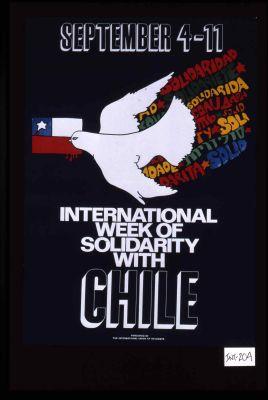The 1973 Chilean coup

The 1973 Chilean coup, often referred to as "the other September 11th", occurred on September 11, 1973, when the Chilean military overthrew and killed president Salvador Allende (Office of the Historian, 2017). This coup replaced the historic democratic government with a dictatorship, with the Defense Minister and Army Commander General Augusto Pinochet becoming president (Office of the Historian, 2017). This coup was sparked by Allende's investment in nationalizations of businesses, which at first appeared to be successful, until inflation rose, and the price of copper (one of the main corporate connections with the United States) drastically dropped. With this coup came the end of a 46-year democratic rule in Chile (Office of the Historian, 2017).
While it initially seemed as though the United States was relatively disconnected from this event, their involvement was much deeper and wider than it seemed at the surface. The United States were actually deeply involved in the government and military actions of Chile from 1963 to 1973, both when it came to influencing elections, as well as the coup of 1973 (Senate Select Committee, 1975). This covert action was mainly associated with the Central Intelligence Agency (CIA), with them spending over 14 million dollars to influence elections and support the military (Senate Select Committee, 1975). The United States took part in a variety of covert action techniques in order to influence the Chilean population and government. These techniques included propaganda and support of the Media, which portrayed the United States as favorable over other countries, worked to gain influence in Chilean groups and private sector organizations, allowing the United States to support groups with their same political view, influencing Chilean elections and supporting certain political parties through funding the Christian Democratic candidates, and finally, through directly promoting the 1973 coup (Senate Select Committee, 1975). After the election of Allende, the United States directly assisted in multiple coup attempts prior to the successful coup of 1973, providing weapons and intelligence information to the government. During the successful 1973 coup, the government continued to collection intelligence, watching as Allende was murdered for his post, and democracy fell (Senate Select Committee, 1975).
The United States, which was first pleased with the coup that they had directly supported, eventually began to have doubts and regrets as the new regime was reportedly violating many human rights (Office of the Historian, 2017; Kelly, 2013). The lack of education and awareness about this event is, as with all topics presented in this libguide, an issue of neutrality and advocacy. The 1973 Chilean coup was one of the biggest economic, political, and social crises to ever occur in Chile. With the involvement of the United States in its occurrence, and the subsequent regrets of the government for supporting the coup, this historical event has been shielded from the American people, and from history.
Collections Detailing the 1973 Chilean coup and Aftermath
Pinochet Files, Richard Nixon Presidential Library and Museum, Yorba Linda, California.
The Pinochet Files consist of materials from the Nixon Presidential Materials collection, specifically located within the Latin American Country Files series. These files cover the election of Salvador Allende, the government efforts to prevent Allende from taking office, the economic, business, and military relations with Chile, events associated with the 1973 coup, and the abuse of human rights that occurred under Pinochet's presidency.
Chilean Subject collection (xx777), Hoover Institution Library & Archives, Stanford, California.
The Chilean Subject collection contains a wide range of materials that document the presidency of Salvador Allende, the 1973 coup, and the subsequent political, economic, and human rights issues that occurred following the coup, as well as documenting the eventual return to a democratic system in the elections of 1989 and 1992. These materials include correspondence, a variety of print materials such as pamphlets and bulletins, reports, meeting minutes, and campaign materials.
Radio sociedad nacional de agricultura broadcast (76044), Hoover Institute Library & Archive, Stanford, California.
This collection consists of a radio broadcast recorded by the Chilean station Radio sociedad nacional de agricultura (national society of agriculture Radio), which relates to the overthrow of the government and Salvador Allende.